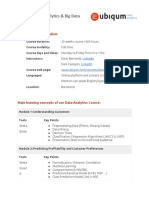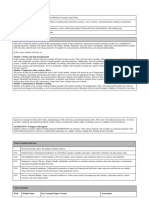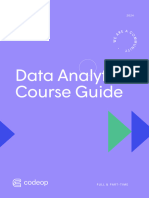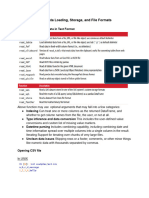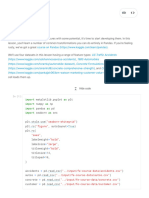Data Analytics with Python - Final Module - 21 Jan
Uploaded by
tareqmahmuduitsData Analytics with Python - Final Module - 21 Jan
Uploaded by
tareqmahmuduitsAkaademy Ltd.
Data Analytics Career Track
The Python Launchpad: From Basics to Insights
A Pre-requisite to Machine Learning
1.5 Months Duration
Published Date – 21 January 2024
Module 01: Introduction to Python
Class 01: Basic Syntax, Structure, and Functions
Topics Covered – This class provides essential programming skills for data analysis. It covers
Python basics like variables, data types, and structures (lists, dictionaries), decision-making
with control structures, and loops for iteration. Students also learn to create reusable code
with functions and use modules and libraries for advanced tasks, forming a strong
foundation for data workflows.
Class 02: Introduction to Numpy Library
Topics Covered - Students learn about NumPy arrays for handling large datasets, perform
operations like addition and slicing, and use mathematical and statistical functions for
analytics. The module covers broadcasting for operations on differently shaped arrays,
random sampling for simulations, and linear algebra functions like matrix operations.
Class 03: Introduction to Pandas Library Part 1
Topics Covered - This class introduces Pandas' core data structures: DataFrames (two-
dimensional, tabular data) and Series (one-dimensional arrays). Students learn to create,
load, and explore these structures to understand their functionality. It covers importing and
exporting data in formats like CSV, and Excel enabling seamless interaction with real-world
datasets. Basic operations such as filtering, sorting, and renaming columns are also explored
to familiarize students with foundational data handling techniques.
Class 04: Introduction to Pandas Library Part 2
Topics Covered - Building on the basics, this class focuses on advanced Pandas features for
cleaning and transforming data. Students learn to handle missing values, detect duplicates,
and restructure datasets using grouping, aggregations, and pivot tables. The class also
covers merging and joining datasets to combine relational data and introduces time-series
analysis tools like resampling and managing date-indexed data. These skills prepare
students to manipulate and prepare datasets for advanced analytics.
Module 02: Introduction to Statistics for Data Analytics
Class 05: Descriptive Statistics and Data Summarization
Topics Covered - This class introduces descriptive statistics, focusing on techniques to
summarize and interpret data. Students will learn measures of central tendency (mean,
median, mode) to represent data and measures of dispersion (variance, standard deviation)
to assess variability. These methods help students understand data distributions and
variability, providing the foundation for effective analysis and interpretation.
Class 06: Probability Basics, Distributions, and Hypothesis Testing
Topics Covered – This class covers essential probability concepts and introduces key
distributions, such as normal and binomial, to predict outcomes and understand event
likelihoods. It also includes the fundamentals of hypothesis testing, such as formulating null
and alternative hypotheses, calculating p-values, and interpreting confidence intervals.
These skills empower students to determine statistical significance in data and draw reliable
conclusions.
Module 03: Exploratory Data Analysis (EDA)
Class 07: Statistical Summaries and Insights in EDA
Topics Covered - This class focuses on the foundational techniques for understanding
datasets using statistical summaries. Students will learn to calculate key statistics such as
mean, median, standard deviation, and quartiles to describe data distribution. Attention is
given to detecting outliers, skewness, and unusual data points that may require
preprocessing. These skills provide a solid understanding of the dataset’s overall structure
and help identify potential issues early in the analysis process.
Class 08: Patterns, Trends, and Correlation Analysis in EDA
Topics Covered - This class emphasizes uncovering hidden patterns and relationships within
data. Students will explore visualizations such as line charts, histograms, and box plots to
identify trends across time or categories. Additionally, the session covers correlation analysis,
including calculating correlation coefficients and creating scatter plots to assess
relationships between variables. These techniques are critical for feature selection and
gaining insights for predictive modeling.
Module 04: Capstone Projects
Class 09: Flood Data Analysis with Python – EDA Project
Topics Covered – In this project, students will use Python to analyze flood-related datasets,
gaining hands-on experience in Exploratory Data Analysis (EDA). They will clean data by
handling missing values and duplicates, calculate statistical summaries like mean and
standard deviation to understand flood trends, and create visualizations such as histograms
and scatter plots to identify patterns in precipitation and water levels. Additionally, students
will explore correlations between factors like rainfall and flood severity, generating actionable
insights for flood prediction and mitigation. This project equips students with practical skills
for real-world data analysis and decision-making.
Class 10: Product Pricing Strategy Analysis with Python – Regression Project
Topics Covered - In the "Product Pricing Strategy Analysis with Python" project, students learn
to leverage regression techniques to determine optimal pricing strategies. They clean and
preprocess pricing and sales datasets, explore relationships between variables, and apply
regression models to predict pricing impacts on sales and profitability. Through visualization
and statistical analysis, students uncover trends and insights, enabling data-driven
recommendations for pricing strategies. This project equips students with practical skills to
analyze market dynamics and optimize business decisions using Python.
Class 11: Customer Behavior Analysis with Python – Regression Project
Topics Covered - In the "Customer Behavior Analysis with Python" regression project, students
analyze customer data to identify patterns and predict behavior. They use data
preprocessing, Exploratory Data Analysis (EDA), and regression models to uncover
relationships between demographics and purchasing trends. This project equips students
with skills to develop data-driven strategies for improving customer engagement and
retention.
Class 12: Product Quality Control Analysis - Regression Project
Topics Covered - In the "Product Quality Control Analysis - Regression Project," students learn
to evaluate and predict product quality using Python. Through data preprocessing, regression
modeling, and statistical analysis, they identify factors influencing quality and detect patterns
in manufacturing data. This project hones their ability to apply machine learning techniques
for quality assurance, optimizing processes, and ensuring consistent product standards.
Course Features
1. Interactive Live Class – 1.5 hours
2. Weekly 2 Classes, Total 12 Classes
3. Class record will be provided
4. Practice Files, Datasets, Notes
5. 100+ Quizzes, 4 Assignments,
6. 4 Industry-based Projects
7. Course Completion Certificate
8. Professional Portfolio Building Support
Important Dates and Information
Mentor - Nazmus Sakib
Start Date – 30 January, 2025
Schedule - Monday, Thursday
Time - 9:30 PM - 11:30 PM
Duration – 1.5 Months (12 Classes)
Number of Capstone Projects – 4
Course Fee – 2100 Taka (Vat + Tax Included)
Early Bird Discount – 1600 Taka (Deadline 30 January, 2025)
One Time Full Payment by Bkash/Rocket/Nogod
Send Money to 01717643264
Enrolment Form: https://forms.gle/sr338dFfm1RWiJwa9
WhatsApp/Email us the last 4 digits
You might also like
- Udacity Enterprise Syllabus Data Analyst nd002No ratings yetUdacity Enterprise Syllabus Data Analyst nd00216 pages
- Data Analytics and Data Science Curiculam Google ADDSNo ratings yetData Analytics and Data Science Curiculam Google ADDS31 pages
- Data Analytics Advanced With Python, Numpy andNo ratings yetData Analytics Advanced With Python, Numpy and6 pages
- MBBA327L_Business Analytics_2023-24 Odd SemesterNo ratings yetMBBA327L_Business Analytics_2023-24 Odd Semester9 pages
- About Course & Syllabus Data Analytics CourseNo ratings yetAbout Course & Syllabus Data Analytics Course4 pages
- Centralized 3MTT Cohort 2 Online Learning CurriculumNo ratings yetCentralized 3MTT Cohort 2 Online Learning Curriculum61 pages
- Data Science Course and Machine Learnign Using PythonNo ratings yetData Science Course and Machine Learnign Using Python3 pages
- Add On Course Details-Learning Outcomes SyllabusNo ratings yetAdd On Course Details-Learning Outcomes Syllabus3 pages
- Data Science and Machine Learning Syllabus V1.0No ratings yetData Science and Machine Learning Syllabus V1.06 pages
- 1152CS239-Intro. To Data Science-SyllabusNo ratings yet1152CS239-Intro. To Data Science-Syllabus6 pages
- Data Science With Advanced Tableau Certification CourseNo ratings yetData Science With Advanced Tableau Certification Course9 pages
- Data Science Mastery: From Beginner to Expert in Big Data AnalyticsFrom EverandData Science Mastery: From Beginner to Expert in Big Data AnalyticsNo ratings yet
- Ivy - Data Science and Data Visualization Certification Course100% (1)Ivy - Data Science and Data Visualization Certification Course10 pages
- Ultimate Enterprise Data Analysis and Forecasting using Python: Leverage Cloud platforms with Azure Time Series Insights and AWS Forecast Components for Deep learning Modeling using Python (English Edition)From EverandUltimate Enterprise Data Analysis and Forecasting using Python: Leverage Cloud platforms with Azure Time Series Insights and AWS Forecast Components for Deep learning Modeling using Python (English Edition)No ratings yet
- Course 9 Applied Data Analytics Second VersionNo ratings yetCourse 9 Applied Data Analytics Second Version16 pages
- Advance Big Data Science Using Python-R-Hadoop-Spark (1/3) : Total Duration: 90 Hours + PracticeNo ratings yetAdvance Big Data Science Using Python-R-Hadoop-Spark (1/3) : Total Duration: 90 Hours + Practice1 page
- Module Handbook PSD-1 Universitas IndonesiaNo ratings yetModule Handbook PSD-1 Universitas Indonesia3 pages
- Learning Data Mining With Python Layton All Chapter Instant Download100% (4)Learning Data Mining With Python Layton All Chapter Instant Download62 pages
- Parlapalee Lakshmanna - Softwear - Developer - EngineerNo ratings yetParlapalee Lakshmanna - Softwear - Developer - Engineer2 pages
- Yardi Software India Pvt Lts Pkg 5.5 LPA 2025 BatchNo ratings yetYardi Software India Pvt Lts Pkg 5.5 LPA 2025 Batch4 pages
- Question Bank Class XII IP 065 One Liner Question AnswerNo ratings yetQuestion Bank Class XII IP 065 One Liner Question Answer8 pages
- @Arcserve@Operations Analyst Hyderabad RemoteNo ratings yet@Arcserve@Operations Analyst Hyderabad Remote10 pages
- CH-6 Data Loading, Storage, and File FormatsNo ratings yetCH-6 Data Loading, Storage, and File Formats163 pages
- List of Programs For Informatics - XII - IPNo ratings yetList of Programs For Informatics - XII - IP26 pages
- Python for Data Analysis Data Wrangling with Pandas NumPy and IPython 1st Edition Wes Mckinney pdf downloadNo ratings yetPython for Data Analysis Data Wrangling with Pandas NumPy and IPython 1st Edition Wes Mckinney pdf download51 pages
- Project Report Covid 19 Analysis TutorialaicsipNo ratings yetProject Report Covid 19 Analysis Tutorialaicsip19 pages
- PRACTICAL FILE (IP CLASS XII) 2024-25 (1) (1)No ratings yetPRACTICAL FILE (IP CLASS XII) 2024-25 (1) (1)27 pages
- Simple RoadMap To Start Your Career As Data AnalystNo ratings yetSimple RoadMap To Start Your Career As Data Analyst21 pages
- Advanced IPL Match Analysis Using Python[Advanced]No ratings yetAdvanced IPL Match Analysis Using Python[Advanced]4 pages

